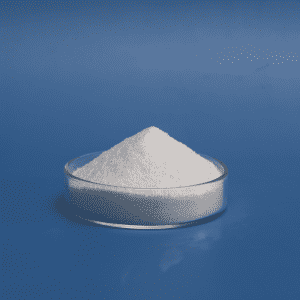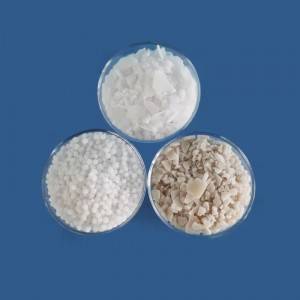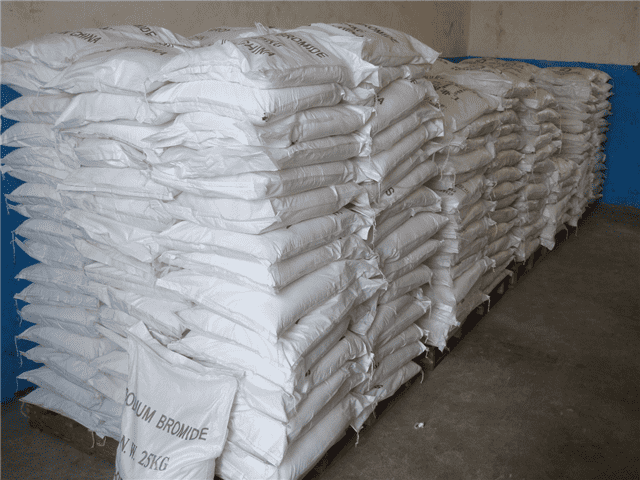Sodium Bromide
Mtundu wa Bizinesi: Wopanga/Factory&Trading Company
Main Product: Magnesium Chloride Calcium Chloride,Barium Chloride,
Sodium bicarbonate, sodium metabisulphite
Chiwerengero cha Ogwira Ntchito: 150
Chaka Chokhazikitsidwa: 2006
Chitsimikizo cha Management System: ISO 9001
Location: Shandong, China (Mainland)
Dzina la Chingerezi: Sodium Bromide
Mayina ena: Sodium Bromide, Bromide, NaBr
Chemical formula: NaBr
Molecular Kulemera kwake: 102.89
Nambala ya CAS: 7647-15-6
Nambala ya EINECS: 231-599-9
Kusungunuka kwamadzi: 121g/100ml/(100℃), 90.5g/100ml (20℃) [3]
HS kodi: 2827510000
Main okhutira: 45% madzi; 98-99% olimba
Maonekedwe: ufa wa kristalo woyera
Zakuthupi
1) Katundu: Krustalo wopanda mtundu wa kiyubiki kapena ufa woyera granular.Ndiwopanda fungo, wamchere komanso owawa pang'ono.
2) Kachulukidwe (g/mL, 25 ° C) : 3.203;
3) Malo osungunuka (℃) : 755;
4) Malo otentha (° C, kuthamanga kwa mumlengalenga): 1390;
5) Refractive index: 1.6412;
6) Kung'anima (° C) : 1390
7) Kusungunuka: kumasungunuka mosavuta m'madzi (kusungunuka ndi 90.5g / 100ml madzi pa 20 ° C, kusungunuka ndi 121g / 100ml madzi pa 100 ° C), njira yamadzimadzi imakhala yosalowerera komanso yoyendetsa.
8) Kuthamanga kwa nthunzi (806 ° C): 1mmHg.
Mankhwala katundu
1) Anhydrous sodium bromide makhiristo amalowa mu njira ya sodium bromide pa 51 ℃, ndipo dihydrate imapangidwa pamene kutentha kumakhala kotsika kuposa 51 ℃.
NaBr + 2 h2o = NaBr · 2 H2O
2) Bromidi ya sodium ikhoza kusinthidwa ndi mpweya wa klorini kuti upereke bromine.
2Br-+Cl2=Br2+2Cl-
3) Sodium bromidi amachitira ndi anaikira sulfuric asidi kupanga bromine, ndiye, pansi pa zochita za asidi oxidizing amphamvu, sodium bromide akhoza oxidized ndi wopanda bromine.
2NaBr+3H2SO4 (yokhazikika) =2NaHSO4+Br2+SO2↑+2H2O
4) Sodium bromide imatha kuchitapo kanthu ndi sulfuric acid kuti ipange hydrogen bromide.
NaBr+H2SO4=HBr+NaHSO4
5) Mu njira yamadzimadzi, sodium bromide imatha kuchitapo kanthu ndi ayoni asiliva kuti apange bromide yasiliva yachikasu yowala.
Br - + Ag + = AgBr kumanzere
6) Electrolysis ya sodium bromide mu chitsulo chosungunuka kuti apange mpweya wa bromine ndi sodium zitsulo.
2 nabr yamphamvu = 2 ndi + Br2
7) Sodium bromide amadzimadzi njira akhoza kupanga sodium bromate ndi haidrojeni ndi electrolysis.
NaBr + 3H2O= electrolytic NaBrO3 + 3H2↑
8) Zochita zakuthupi zimatha kuchitika, monga momwe zimachitikira popanga bromoethane:
NaBr + - H2SO4 + CH2CH2OH ⇌ NaHSO4 + CH3CH2Br + H2O
Zofotokozera
Zofunikira za sodium Bromide:
| Zinthu | Kufotokozera |
| Maonekedwe | Zowoneka bwino, zopanda mtundu mpaka zachikasu |
| Kuyesa (monga NaBr)% | 45-47 |
| PH | 6-8 |
| Chiphuphu (NTU) | ≤2.5 |
| Specific Gravity | 1.470-1.520 |
| Kanthu | Kufotokozera | |
|
| Tumizani Giredi | Gulu la Zithunzi |
| Maonekedwe | White Crystal | White Crystal |
| Kuyesa (monga NaBr)%≥ | 99.0 | 99.5 |
| Digiri ya Clearance | Kupambana mayeso | Kupambana mayeso |
| Chloride (monga CL)%≤ | 0.1 | 0.1 |
| Sulphates (monga SO4)%≤ | 0.01 | 0.005 |
| Bromates (monga BrO3)%≤ | 0.003 | 0.001 |
| PH (10% yankho pa 25 digiri C) | 5-8 | 5-8 |
| Chinyezi% | 0.5 | 0.3 |
| Kutsogolera (monga Pb)%≤ | 0.0005 | 0.0003 |
| Iodide (monga I)%≤ |
| 0.006 |
1) Njira ya mafakitale
Bromine yochulukirapo pang'ono imawonjezedwa mwachindunji ku saturated sodium hydroxide thermal solution kuti apange chisakanizo cha bromide ndi bromate:
3Br2+6NaOH=5NaBr+NaBrO3+3H2O
Chosakanizacho chimasungunuka kuti chiume, ndipo zotsalira zake zolimba zimasakanizidwa ndi tona ndikutenthetsa kuti bromate ikhale bromide:
NaBrO3 = NaBr + 3 c + 3 co lembani
Pomaliza, amasungunuka m'madzi, kenako amasefedwa ndikuwunikiridwa, ndikuwumitsa pa 110 mpaka 130 digiri Celsius.
*Njira imeneyi ndi njira wamba yopangira bromide ndi bromine ndipo imagwiritsidwa ntchito m'makampani.
2) Njira yosalowerera ndale
Gwiritsani ntchito sodium bicarbonate monga zopangira: Sungunulani sodium bicarbonate m'madzi, ndiyeno neutralize ndi 35% -40% hydrobromide kupeza sodium bromidi njira, amene condensed ndi utakhazikika kuti precipitate sodium bromide dihydrate.Sefa, sungunulani dihydrate ndi madzi pang'ono, dontho bromine madzi mpaka mtundu wa bromine imangoonekera mu anhydrogen aquelour solution, hydrogen aquelour solution kubweretsa anhydrogen aquelour solution. wiritsani.Pa kutentha kwakukulu, anhydrous crystallization precipitates, ndipo itatha kuyanika, imasamutsidwa ku chowumitsa ndikusungidwa pa 110 kwa ora la 1. Kenaka imakhazikika mu chowumitsa ndi calcium bromide desiccant kuti ipeze anhydrous sodium bromide (reagent grade).
Mfundo yochitira: HBr+ NAHCO ₃→NaBr+CO2↑+H2O
Ndi 40% madzi amchere monga zopangira: ikani asidi hydrobromide mu mphika anachita, pansi yogwira mtima nthawi zonse, pang'onopang'ono kuwonjezera 40% madzi alkali njira, neutralize kwa pH7.5 - 8.0, amatani kupanga sodium bromide solution.The sodium bromide njira anali centrifuged ndi osasankhidwa mu dilute sodium bromide njira yosungirako thanki. wa 1. 55 ° Khalani kapena kupitilira, kusefera kwa centrifugal, kusefera mu tanki yosungiramo madzi a sodium bromide. Kenako kukanikizidwa mu thanki ya crystallization, mu crystallization yochititsa chidwi yozizirira, ndiyeno crystallization ya kupatukana kwa centrifugal, chotsirizidwa.
Mfundo yochitira: HBr+NaOH→NaBr+H2O
3) Njira yochepetsera urea:
Mu thanki ya alkali, soda imasungunuka m'madzi otentha pa kutentha kwa 50-60 ° C, ndiyeno urea.
amawonjezeredwa kuti asungunuke 21 ° Khalani yankho.Kenaka mumphika wochepetsera, pang'onopang'ono kupyolera mu bromine, sungani kutentha kwa 75-85 °C, mpaka pH ya 6-7, ndiko kuti, kufika kumapeto kwa zomwe zimachitika, siyani bromine ndi kuyambitsa, pezani sodium bromide solution.
Sinthani pH kukhala 2 ndi hydrobromic acid, ndiyeno sinthani pH kukhala 6-7 ndi urea ndi sodium hydroxide kuchotsa bromate. Njira yothetsera imatenthedwa mpaka chithupsa ndipo njira yodzaza ya barium bromide imawonjezedwa pa pH6 --7 kuchotsa sulfate. 4-6 maola. Njirayi itatha kufotokozedwa, imasefedwa, imatuluka mumlengalenga, ndipo zinthu zapakatikati zimadzazidwa kangapo. Siyani kudyetsa kwa maola a 2 musanayambe crystallization. Sinthani pH ku 6-7 1 ora musanayambe crystallization. Bromide ya sodium inalekanitsidwa ndikuwumitsidwa mu chowumitsa ng'oma yozungulira.
Mfundo yofunika kuchita: 3Br2+3Na2CO3+ NH2ConH2 =6NaBr+4CO2↑+N2↑+2H2O
1) Makampani okhudzidwa pokonzekera sensitizer ya kanema.
2) mu mankhwala kwa kupanga okodzetsa ndi sedatives, ntchito zochizira neurasthenia, minyewa kusowa tulo, maganizo chisangalalo, etc.Sedatives kusiyanitsa ayoni bromide mu thupi ndi wofatsa chopinga kwenikweni pa chapakati mantha dongosolo, kukhazika pansi wosakhazikika ndi okondwa nkhuku.Imatengeka mosavuta ndi zinthu ngati nkhuku, koma chifukwa cha kutengeka ndi kupsyinjika kwapang'onopang'ono. mlomo, jekeseni mankhwala, katemera, kugwidwa, kutenga magazi kapena kupha mankhwala.
3) Amagwiritsidwa ntchito popanga zonunkhira mumakampani onunkhira.
4) amagwiritsidwa ntchito ngati brominating wothandizira pamakampani osindikiza ndi utoto.
5) Amagwiritsidwanso ntchito pofufuza kutsimikiza kwa cadmium, kukonza zotsukira zochapira zokha, kupanga bromide, kaphatikizidwe ka organic, mbale zojambulira ndi zina zotero.
1) Amagwiritsidwa ntchito pofufuza ndi kutsimikiza kwa tellurium ndi niobium ndikukonzekera njira yopangira mapulogalamu, yomwe imagwiritsidwanso ntchito ngati kuchepetsa;
2) Amagwiritsidwa ntchito ngati zopangidwa ndi anthu CHIKWANGWANI stabilizer, nsalu bleaching wothandizira, zithunzi kutukula, utoto ndi bleaching deoxidizer, kukoma ndi utoto kuchepetsa wothandizira, pepala lignin remover, etc.
3) Ntchito ngati wamba kusanthula reagent ndi photosensitive resistor zakuthupi;
4) Reductive bleaching agent, yomwe imakhala ndi blekning pa chakudya komanso imalepheretsa kwambiri oxidase muzakudya zamasamba.
5) Makampani osindikizira ndi opaka utoto monga deoxidizer ndi bulichi, omwe amagwiritsidwa ntchito pophika nsalu zosiyanasiyana za thonje, angalepheretse makutidwe ndi okosijeni am'deralo a ulusi wa thonje komanso kukhudza mphamvu ya fiber, komanso kuwongolera kuyera kwa zinthu zophika.
6) Amagwiritsidwa ntchito ndi makampani opanga nsalu ngati chokhazikika cha ulusi wopangidwa ndi anthu.
7) Makampani opanga zamagetsi amagwiritsidwa ntchito popanga ma photosensitive resistors.
8) Madzi mankhwala makampani electroplating madzi oipa, mankhwala akumwa madzi;
9) Amagwiritsidwa ntchito ngati bleach, preservative, kumasula wothandizila ndi antioxidant m'makampani azakudya. Amagwiritsidwanso ntchito mu kaphatikizidwe ka mankhwala komanso ngati chochepetsera pakupanga masamba osowa madzi.
10) Ntchito kupanga mapadi sulfite ester, sodium thiosulfate, mankhwala organic, bleached nsalu, etc., amagwiritsidwanso ntchito monga kuchepetsa wothandizila, preservative, dechlorination wothandizila, etc.;
11) Laboratory imagwiritsidwa ntchito popanga sulfure dioxide
Asia Africa Australasia
Europe Middle East
North America Central / South America
General ma CD mfundo: 25KG, 50KG; 500KG; 1000KG, 1250KG Jumbo Thumba;
Phukusi Kukula : Jumbo thumba kukula: 95 * 95 * 125-110 * 110 * 130;
25kg thumba kukula: 50 * 80-55 * 85
Chikwama chaching'ono ndi thumba la magawo awiri, ndipo wosanjikiza wakunja amakhala ndi filimu yophimba, yomwe ingalepheretse kuyamwa kwa chinyezi. Jumbo Bag imawonjezera zowonjezera zoteteza UV, zoyenera kuyenda mtunda wautali, komanso nyengo zosiyanasiyana.
Nthawi Yolipira: TT, LC kapena pokambirana
Port of Loading: Qingdao Port, China
Nthawi Yotsogolera: 10-30days mutatsimikizira dongosolo
Ma Oder Ang'onoang'ono Ovomerezeka Apezeka
Distributorships Anapereka Mbiri
Price Quality Prompt Kutumiza
Chitsimikizo Chovomerezeka Padziko Lonse / Chitsimikizo
Dziko Lochokera, CO/Fomu A/Fomu E/Fomu F...
Khalani ndi zaka zopitilira 15 zaukadaulo popanga Sodiium Bromide;
Mutha kusintha makonda anu malinga ndi zomwe mukufuna; Chitetezo cha thumba la jumbo ndi 5: 1;
Lamulo laling'ono ndilovomerezeka, zitsanzo zaulere zilipo;
Perekani kusanthula koyenera kwa msika ndi mayankho azinthu;
Kupatsa makasitomala mtengo wopikisana kwambiri pamlingo uliwonse;
Kutsika kwamitengo yopangira zinthu chifukwa cha ubwino wa zinthu za m'deralo komanso zotsika mtengo zoyendera
chifukwa chapafupi ndi ma docks, onetsetsani mtengo wopikisana.
1. Iyenera kusungidwa pamalo owuma, ozizira komanso mpweya wabwino.Kuteteza ku dzuwa, ndi kudzipatula kwa moto ndi kutentha, osati ndi ammonia, oxygen, phosphorous, antimoni powder ndi alkali mu zonse zosungirako ndi zoyendetsa.Tips ta nkhuni, shavings ndi udzu ziyenera kusungidwa kutali kuti zisawotchedwe.
2. Pakakhala moto, zozimitsa moto zamchenga ndi carbon dioxide zitha kugwiritsidwa ntchito kuzimitsa motowo.






